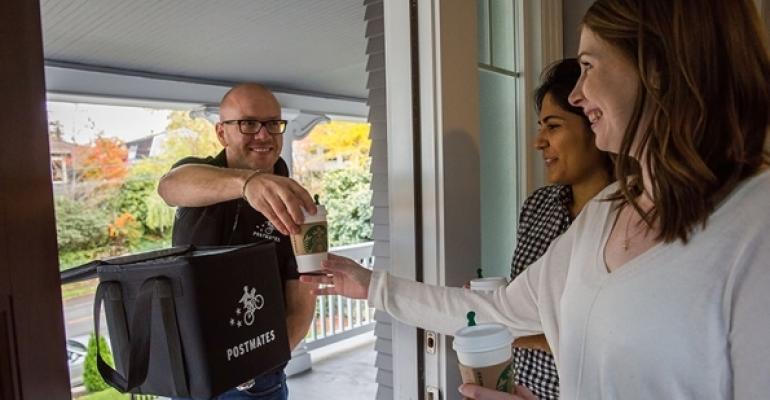Damien Orato and Suzanne Singer are partners with Rumberger Kirk & Caldwell. This article does not necessarily reflect the opinions of the editors or management of Nation’s Restaurant News.
UberEats. Postmates. Seamless. Grubhub. Eat 24. These are just a few of the names leading the market in the quickly growing field of third-party delivery services.
Third-party deliver generally lifts revenue by generating additional business for restaurants, especially among Millennials, who prioritize instant accessibility over cost. The introduction of third-party delivery to a restaurant’s business model is especially enticing because some sales are in decline. The convenience factor these services bring to the table is something the restaurant industry cannot overlook.
In the midst of this tech renaissance, where maximizing convenience is king, there are important liability considerations associated with third-party delivery people bridging the gap between the restaurant and consumer. Emerging issues in this new landscape include the potential for increased litigation involving matters such as foodborne illnesses, auto accidents and possible intentional or criminal acts by delivery personnel. So, how can restaurants minimize the potential for liability exposure while using third-party delivery services?
A recent interview with a Grubhub corporate employee confirmed that Grubhub, as is the case with most of these providers, maintains written partnership agreements with all of the restaurants for which it provides services. Regardless, and given the nature of litigants who look for the classic “deep pocket,” it makes sense that customers will hold restaurants at least partially responsible for errors, even if restaurants have formal agreements with third-party delivery companies, and even though the consumer never interfaces with the restaurant itself during these transactions.
To mitigate risk, restaurants that utilize third-party delivery services should include not only basic operational content in these agreements, like menu pricing, but also adequate liability limitation language. In formulating such a partnership, restaurants should consider the following provisions in any written agreement:
- Require the third-party delivery service and its drivers to actively disclaim any agency relationship with the restaurant;
- Include strong indemnification terms which provide for a full shift of responsibility to the third-party delivery service for any claims arising from a consumer’s use of the services;
- Require third-party delivery services to carry insurance coverage that names the restaurant(s) as an additional insured;
- Require proof of insurance by the third-party delivery service and for any driver it utilizes, including the requirement of clear vehicle ownership by the driver or service;
- Require compliance with industry standards for safe food handling, including temperature maintenance and procedures to follow in case a customer is unavailable to take the delivery of an order at the time specified; and
- Partner with a third-party delivery service that uses tracking technology so the “chain of custody” can be firmly established to aid in the defense of foodborne illness cases.
Another emerging concern involves third-party delivery services like Postmates, which sometimes delivers from restaurants without permission. Some restaurants may already be engaging with third-party delivery services without their knowledge. These types of services weigh providing a wider array of choice over forging distinct partnerships. Even with this type of passive permission from the restaurant, there is still a risk of a non-verbal partnership creating liability exposure. For this reason, restaurants should safeguard against unsanctioned delivery services in order to inform the public that the third party operates independently from the restaurant. Here’s how to do that:
- Specify the third-party delivery service that the restaurant has agreements with and issue disclaimers on the restaurant website regarding unauthorized services;
- Include disclaimer language in take-out or delivery menus; and
- Include disclaimer language in any online or paper advertisement for the restaurant.
As technology evolves and becomes more innovative, we can expect a spike in personal injury or consumer protection lawsuits involving these types of third-party delivery services. It is important to take precautionary measures to reduce the risk of liability.
Damien Orato is a partner in the Orlando, Fla., office of Rumberger, Kirk & Caldwell. He represents clients in cases involving premises liability and significant and catastrophic injuries as well as wrongful death claims. Contact him at [email protected]. Suzanne Singer is a partner in the Miami office of Rumberger, Kirk & Caldwell. Her practice focuses on defending clients in the restaurant and hospitality industry in tort claims involving premises liability, wrongful death and employment issues. Contact her at [email protected].





